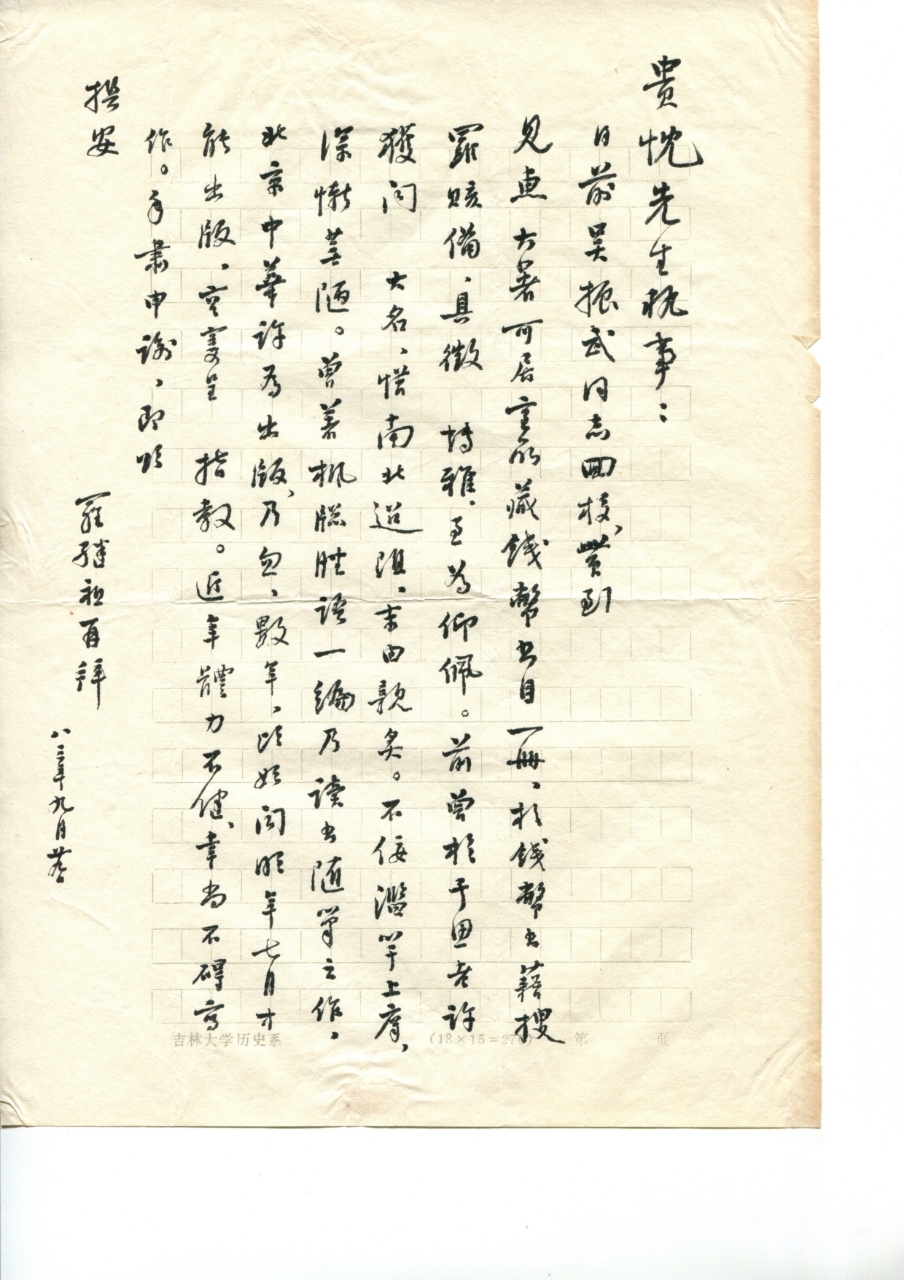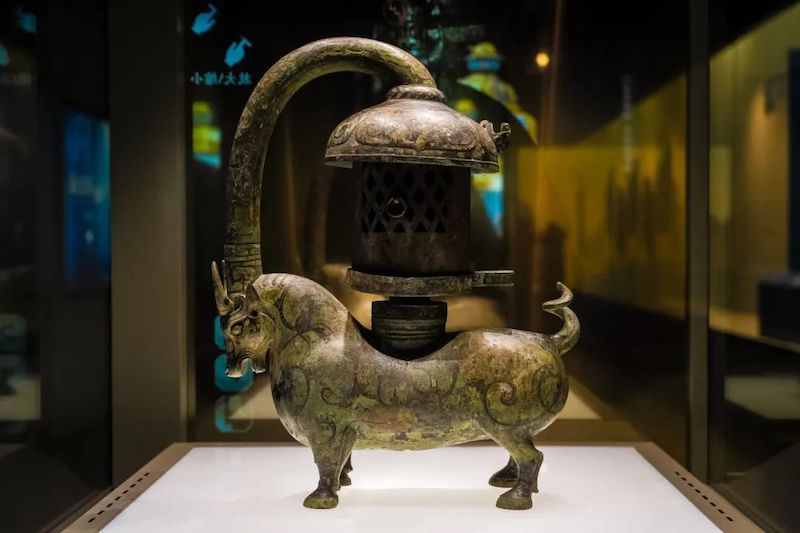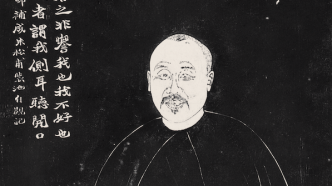
Luo Jizu (1913-2002) and Wang Guichen (1928-2022) are both well-known modern scholars of literature and history, as well as calligraphers. One lives in the Northeast, and the other lives in Lingnan. The two elders began to correspond and establish a relationship in September 1983, introduced by Mr. Xingwu. Although they kept in touch during that period, they only met once, 12 years later, on April 25, 1995. Today is the 30th anniversary of their meeting. The author of this article was with them at the time, and on the occasion of the publication of "Letter from Luo Jizu to Wang Guichen", he wrote down this past event and the demeanor of the senior scholars.
Mr. Gui (Mr. Wang Guichen) paid special attention to the use of letters and handwritten inscriptions in his academic research, and paid more attention to the compilation and publication of letters and handwritten inscriptions. In an interview in his later years, he said: "I have published too many books, and I don't know how many there are. The greatest achievement is "Letters of Famous People in the Qing Dynasty and the Republic of China in the Keju Room". " ("Literary and Historical Scholar Wang Guichen" P200) Mr. Gui once gave a speech entitled "A Fragrance of Famous People's Letters in Northeast China" ("Keju Collection" P695). At the end of the speech, he specifically talked about the four meanings of collecting letters, and emphasized the "first-hand historical materials" contained in the letters. This speech was given in Dalian, where Mr. Luo lived in his later years, at the invitation of Brother Xiao Wenli and Mr. Zhang Benyi, the then director of Dalian Library.

Letter from Luo Jizu to Wang Guichen
It was also in this speech that Mr. Gui mentioned: "My childhood teacher knew Luo Xuetang, and later I met his eldest grandson, Mr. Luo Jizu." Mr. Gui has a special feeling for the Luo family. From his childhood teacher to his later teachers Yu Xingwu, Rong Geng, and Shang Chengzuo, they all have inextricable ties with the Luo family. Mr. Gui and Mr. Luo corresponded constantly from 1983 to 2001. Publishing Mr. Luo's letters is one of Mr. Gui's wishes. I always think that Mr. Gui's unremitting publication of these correspondences between teachers and teachers is not only to prevent the "first-hand historical materials" contained in them from being submerged, but more importantly, Mr. Gui feels that he is a link in these academic lineages, and it is his responsibility to pass on the cultural context.
Mr. Gui and Mr. Luo started to correspond with each other in September 1983, introduced by Mr. Yu Shengwu. Although they kept in touch with each other, they only met once in 12 years. I was lucky enough to be by their side.

(From left to right) Su Chen, Luo Jizu, Wang Guichen
Regarding this meeting, Mr. Gui himself has written a record. When he wrote the inscription on the revised version of "Biography of Wang Zhongqi of Haining" edited by Luo Zhenyu, he said: "In April 1995, I went to Dalian with Su Chen and Song Hao to visit Mr. Luo Jizu. I showed this copy to Mr. Luo and asked him to add a preface. He was happy to write it immediately." (Keju Collection, p679)
Mr. Luo was even happier. After the meeting, he sent a poem to Mr. Su and Mr. Wang: "Flying here and there and flying back and forth, how joyful it is to fly across the sea and across the sky. Carrying the works left by Xuetang to go, I hope that the plum blossoms will bloom on the hilltops of Huacheng." Later, this poem was included in "Liang Qixuan Yunyu" (P75), and the date was also April 95.
Soon after they met, Mr. Su Chen wrote "Revisiting Luo Jizu at Liangqixuan in Dalian" and published it many times. The article recorded the people who came on this trip: "In addition to Song Hao from the Library Department of Guangdong Provincial Publishing Bureau, Huang Shangli, President of Guangdong Education Press, and me, there was also Researcher Wang Guichen. Huang Shangli had something to do in Beijing, so he left first. After he finished his business, he immediately transferred from Beijing to Dalian to meet us. He sent editor Xiao Pan to Dalian to make arrangements first."
In addition, Mr. Su published Luo Zhenyu's "Record of the Remaining Stele of Ziyou in the Early Yuan Dynasty of the Later Han Dynasty" in the first issue of "Xue Tu" in March 1996, and wrote an "Editor's Note": "On April 25, 1995, the editor and Huang Shangli, president of Guangdong Education Press, and others went to Baiyun New Village in Dalian to visit Luo Zhenyu's eldest grandson, the famous historian and professor of Jilin University Luo Jizu, to discuss the editing and publication of Luo Zhenyu's "Xuetang Academic Works Collection".
The 84-year-old owner of Liangqixuan, Professor Luo Jizu, greeted us with pleasure and first talked about the fate of his ancestor Xuetang and Guangdong: he was fortunate to buy a large number of rare books in Guangdong in the past, and now he has the opportunity to publish his own academic works in Guangdong. We also said: we just left Guangzhou Baiyun Airport and came to Dalian Baiyun New Village.
The bookcase in Liangqixuan is filled with the 140-volume Taiwan edition of Luo Zhenyu's Complete Works. By comparison, the Guangdong edition of Xuetang's Academic Works should certainly be even more refined. So we had a pleasant conversation.
Before leaving, my companion, Brother Wang Guichen, showed Luo Xuetang's manuscript of "Record of the Remaining Stele of Ziyou in the Early Yuan Dynasty of the Later Han Dynasty" to Mr. Luo. The owner of Liang Qixuan was surprised that he was also seeing the original manuscript for the first time. "The Four Drafts of Yongfeng Villagers" did not contain the original text of the Remaining Stele. Despite his poor eyesight, he still used a brush to write a short postscript in tiny characters. "
I later published Litang Zizhen Collection for Su Lao, and in the postscript I also recalled two small fragments of this special visit to Luo Lao: "In 1995, we proposed a publishing plan for a collection of modern academic works, planning to publish the collections or complete works of Shen Zengzhi, Luo Zhenyu, Yu Guowei, Chen Yuan, Rong Geng and others. Director Zhou Shengying asked Su Lao to take the lead. During that time, I went on business trips with Su Lao to various places to collect manuscripts and visited many old gentlemen.
Mr. Su has written articles about the process of visiting Mr. Luo Jizu and Mr. Qian Zhonglian. I remember on the way to visit Mr. Luo Jizu, we talked about whether Mr. Luo could speak Japanese. I said that Mr. Luo grew up in Japan, so he must be fluent in Japanese. Mr. Su said, let's make a bet. Given the atmosphere of the Luo family, they would not let their children come into contact with Japanese people, so Mr. Luo must not know Japanese. When we arrived at Mr. Luo's house, we asked Mr. Luo this question directly. Mr. Luo said that not only did he not learn Japanese when he was young, but he rejected Japanese even more after he became an adult, so he never knew Japanese. At that time, Mr. Luo's hearing was already very weak, and many of the conversations were in writing. It would be great if the written records were still there. "
This is roughly the background of this visit. But based on my memory and the information I have, I can still add some details about the meeting.
I met Mr. Luo Suizu not long ago, and I talked to him about the visit with you to Mr. Luo. I said that what impressed me most was the family tradition of the Luo family. After we visited the Luo family, Mr. Luo came to the hotel where we were staying the next morning to pay us a return visit and invited us to a family dinner. I was the first person to go there, and the hotel we booked was very small. At that time, Mr. Luo's eyesight was very poor and it was very inconvenient for him to move. The scene of Mr. Luo being supported by two people and moving around in front of the hotel door still makes me feel guilty. Mr. Wang Tongce, who accompanied Mr. Luo on the return visit, said that Mr. Luo followed the ancient etiquette and would return the visit when a distant guest came. He could not be persuaded. This was the family tradition.
Mr. Luo's family dinner was lively and sumptuous. Mr. Su's article recorded it, titled "Eating Crabs at Liangqixuan". At that time, even hotels in Dalian rarely provided seafood, and the hotel we stayed in was even more shabby. I checked in first and went downstairs for dinner alone. I ordered one dish and one soup. The waitress said that there was nothing good in Dalian, so you can just order half a portion. Mr. Luo specially asked his children to go to the seafood market at four in the morning to buy seafood for the Luo family. I remember that one of the dishes was conch, which was very delicious. I have never eaten such delicious food in Guangzhou.
On this trip, you brought the calligraphy of Yu Shengwu and Zhou Shutao to Mr. Luo, and also brought several documents related to Luo Zhenyu for Mr. Luo to write inscriptions. I went to Dalian via Beijing, and happened to buy a set of "Miscellaneous Writings of Liao Residence, Part B" in Haiwang Village, and also took it out to ask Mr. Luo to write inscriptions. Mr. Luo wrote inscriptions that night: "This is a copy of the book when I was at home in Lushun. There were not many copies at that time, but the copy was very fine. Today, there is no such writer. Song Haojun asked me to write inscriptions. It has been nearly 70 years since then. My old eyes are blurry and I can't write a single word. I am ashamed. It was written by Mr. Luo Jizu, an old man in his residence in Dalian, in the late spring of Yi Hai." He gave it to me early the next morning.
Mr. Gui asked Mr. Luo to leave his calligraphy for everyone, and Mr. Luo readily agreed and wrote a scroll for each person before leaving. The one he wrote to Mr. Su was "The willows on the roadside of the soldiers, the cuckoos in the house of the travelers." I don't remember what he wrote to President Huang and Mr. Pan Yingwei. The one he wrote to me was "Who knows that I am worried about the world, and reading the world will hurt people's lives. Comrade Song Hao's elegant instructions. Gan Ru Ba San Weng Luo Jizu." Because of the three words "people's lives are in danger", I was quite unhappy, but in the following years of the epidemic, it was always Mr. Luo's calligraphy that popped up in my mind from time to time. This sentence is Mr. Luo's self-written couplet, which was later included in "Liang Qixuan Yunyu". When giving us these scrolls, Mr. Wang Tongce said that Mr. Luo had severe cataracts and blurred vision. He was the one who pulled the paper when writing these scrolls, and Mr. Luo wrote in the same position, but the words were really well written. Later, after cataract surgery, Mr. Luo was very happy to regain his sight, and wrote me another painting: "Not evil, not contaminated, not Zen, only the pure and clear see the true nature. All things in the world strive for purity, and I have spoken of my love for lotus in Lianxi three times. Comrade Song Hao loves my "Lotus Poems in Lianxi", and wrote to me asking me to copy it, and I beg for both teachings. On the 24th day of the early autumn of Dingchou, Luo Jizu, the 85th Mr. Gan, wrote this at Baiyun Mountain Villa in Lianwan." It was stamped with the seal "Written by Mr. Gan after regaining his sight". It is not as vigorous as this painting.

Luo Jizu's calligraphy
You especially admired Mr. Luo's calligraphy. In 2001, Mr. Luo's "Notes on Calligraphy" was published. You bought a stack and gave it to friends. The one you gave me was specially inscribed with the following words: "Mr. Luo's calligraphy theory is in line with mine, but he thinks his knowledge is higher than mine. So I am happy to present it to my fellow countryman Song Hao and Tong for their appreciation. I sincerely present it to you."
In 1983, Mr. Luo's second letter to Mr. Gui mentioned that he was compiling the "Selected Works of Luo Xuetang". Mr. Gui has always kept it in mind, so when our plan came out, Mr. Gui immediately proposed to publish Luo Zhenyu's works first, and immediately wrote to Mr. Luo to contact him. That's why we met this time. After that, Mr. Luo published "Luo Zhenyu's Seal Carving" and "Shen Zengzhi's Letter to Luo Zhenyu" in Guangdong's "Xuetu", and published a series of essays in the biweekly "Yangcheng Evening News·Literature and History Collection" hosted by Brother Luo Tao. I also took Mr. Luo's work "The Death of Wang Guowei" and handed it over to Guangdong Education Press for publication. The editor of the book, Brother Lu Jiaming, happened to be a student of Mr. Luo and Mr. Wang Tongce. In addition, when Mr. Gui was the editor-in-chief of "Lingnan Calligraphy", Mr. Luo was an important author. Because of these, Mr. Luo and Guangdong have a considerable academic origin.
Unfortunately, due to the limited publishing conditions at that time, the "Xuetang Collection of Essays" could not be published in Guangdong. But it is gratifying that Xiao Wenli and his team finally completed this important task, and the magnificent masterpiece was published. In 1995, I was in Luo's house for negotiation, and Brother Xiao also happened to be there. The aforementioned speech by the elder on the letters of Northeastern scholars was part of the publication and release of the "Luo Xuetang Collection" of 39 boxes and 188 volumes. During this event, the elder also brought back two boxes of the "Collection" and gave them to Mr. Dong Qiao in Hong Kong. Mr. Dong wrote "Two Ginkgo Trees in Front of the Door" to record the event. This article was published in a magazine that I was the editor-in-chief at the time, and later Mr. Dong collected it in "The Wind and the Day Are Good Today".

"A Letter from Luo Jizu of Kejushi to Wang Guichen" Lingnan Ancient Books Publishing House
* * *
When the book had been published and was about to be printed, Mr. Luo's grandson, Mr. Luo Gan, sent thirty-three letters from you to Mr. Luo.
These thirty-three letters, spanning from May 1986 to December 2001, are not all of the letters from Gui Lao to Luo Lao, but they are very rare and precious. For example, in the letter from Gui Lao to Luo Lao on September 3, 1999, he said: "Gui Chen lost his education since childhood. When he was a little older, he read Xue Tang's posthumous works and admired his morality and articles. He did not believe the slanderous words that some people put on Mr. Xue Tang in the relationship between Luo and Wang. In the mid-1950s, Gui Chen once copied Xue Tang's calligraphy. Although his learning ability is not enough, his practice is not deep, and his calligraphy is not good, he still wants to express his gratitude." It turns out that Gui Lao had already started copying Xue Tang's calligraphy before he was 30 years old.

The earliest of these thirty-three letters was a discussion between you and Luo about Zhou Zuoren's comments on Xuetang's "Cunzhuo Zhai Zhashu". What's more, when Dawen was reading this letter, he bought Xuetang's old collection "Xuetang Jiaokan Qunshu Xulu" at an auction in Beijing. You wrote two postscripts in the book. You said in the postscript: "Mr. Qiming praised Luo's prefaces and postscripts in his notes. Now I have seen the original book and I have read it roughly. I know that Mr. Qi's praise is not false." The signature is "Dingyou Spring", which is 1957. Not long after that, you were punished for your words and your collection of books was lost.

Wang Guichen's Collection of Books in Xuetang
(The author is a researcher of literature and history, and this article is published with some omissions)

